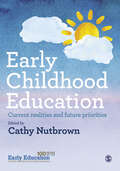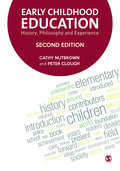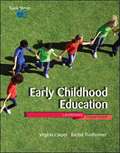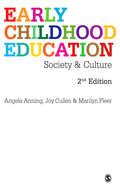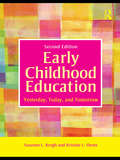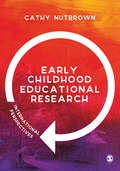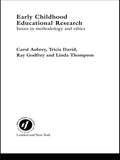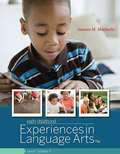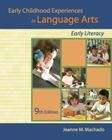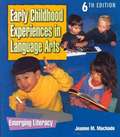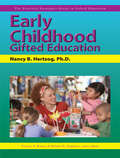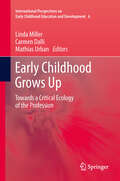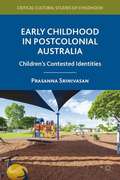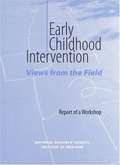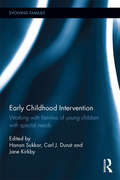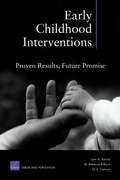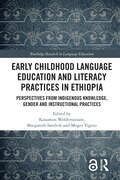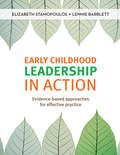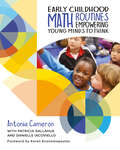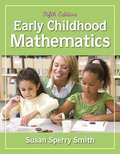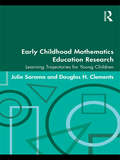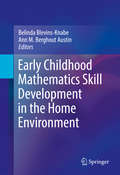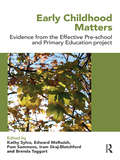- Table View
- List View
Early Childhood Education: Current realities and future priorities
by Cathy NutbrownThis book provides an overview of current practice, policy, and research in early childhood education across the UK. It brings together chapters on all core aspects of early years education and spotlighting vital new areas - each written by established and emerging stars in the field. Each chapter features: • an overview of research in the field • critiques of relevant policy • examples from current practice • an agenda for the future • suggestions for further reading and resources. This text is an accessible and comprehensive read for students and practitioners in the early years sector alike. Cathy Nutbrown is Professor of Education at the University of Sheffield and President of Early Education
Early Childhood Education: History, Philosophy and Experience
by Cathy Nutbrown Peter CloughThis accessible introduction to the history of early childhood education emphasises the role of history and philosophy in early childhood practice today. Firmly grounded in current policy from across the UK, the text features a series of imagined conversations with key figures and pioneers, which exemplify various philosophical positions in early childhood. This second edition has been fully updated and revised in line with recent policy changes, and contains new and updated biographies of key pioneers as well as three brand new conversations with historical figures. The book is useful for a range of students of Early Childhood Education or History of Education, from first year undergraduates to PhD students. It will also be incredibly valuable to Early Years trainee teachers, practitioners and policy makers.
Early Childhood Education: Learning Together
by Virginia Casper Rachel TheilheimerEarly Childhood Education: Learning Together provides a comprehensive overview of early childhood education. This exciting new text encourages students to understand the need for flexible approaches in their work with children. Early childhood education is not a "one size fits all" proposition, so this text encourages students in multiple ways to reflect upon why they are doing what they are doing. With connections to NAEYC standards, case studies, and essays from real people on the front lines of early childhood education, students will leave the course with a superior foundation in both the theoretical aspects of ECE and the real world applications of those theories. In developing Early Childhood Education: Learning Together, we bring together the best research and the most effective practices in Early Childhood. We have heard that many students are using their first Early Childhood course to explore their interest in the field - perhaps to discover a new profession or a second career. These comments shaped every aspect of Early Childhood Education: Learning Together. The resulting textbook is infused with real cases, NAEYC standards, and graphs and tables for easy reference and student review. We also understand that college can be a financial challenge for students. Because of this,Early Childhood Education: Learning Together is half the price of comparable introductory texts.
Early Childhood Education: Society and Culture (Aspe Papers On Managing Primary Education Ser. #7)
by Marilyn Fleer Angela Anning Joy Cullen'The authors who have contributed to this book bring a wealth of expertise and a wide range of research findings. This gives the reader the opportunity to link theory with practice in a helpful and illuminating way' - Early Years Update Praise for the first edition: `...represents an enormously rich body of research and expertise focused on the objective of taking into account the social, historical and cultural dimensions of everyday activities in order to better understand children. ...will undoubtedly be of interest and value to anyone with a similar concern' - Early Years Journal `...an international state-of-the-art early childhood education publication that sets out research-based evidence and critically links this with theory and practice. It is pitched at the graduate level and beyond. Readers will gain more from the book if they have a thorough base understanding of relevant learning and social-cultural theories and an open-mind to appreciate the perspectives presented in this book' - Childforum, New Zealand This fully revised and up-to-date edition examines sociocultural and historical approaches to current theories of learning in early childhood education. It sets out research-based evidence linking theory and practice in early childhood settings. Written by leading figures in the field, the book extends a strong and traditional theme - the importance of the child's perspective and respect for each child's individual background. Within the context of early years settings, the book is structured around four overall themes: - the dynamics of learning and teaching - the nature of knowledge - assessment - evaluation and quality. This book is essential reading for undergraduate and advanced courses in early childhood studies.
Early Childhood Education: Yesterday, Today, and Tomorrow
by Suzanne L. Krogh Kristine L. SlentzIn an accessible and meaningful way, Early Childhood Education examines foundational topics that encourage early childhood education students to think, reflect, and develop opinions, theories, and philosophies about their field. This interactive book invites the reader to develop a personal philosophy of early childhood education and an identity as an early educator, in order to build a sufficient foundation for continual growth as a teacher. Divided into three sections that deal with the past, present, and future, Early Childhood Education asks the reader to think about important ideas underlying and encompassing today’s early childhood education. First providing historical and philosophical perspectives of the field, authors Krogh and Slentz then look at careers in early education and what it's like to be a teacher or caregiver today, compare and contrast contemporary models of early childhood education, and examine cultural and individual differences that confront and challenge teachers. Finally, the book looks to the future of the field and discusses debates of current issues. The newly updated edition includes the most contemporary issues in the field since the first edition and integrates further discussion of diversity and children with special needs throughout the entire book. Special Features: End of chapter questions invite readers to develop an ongoing philosophy of teaching and learning. "Extending your Learning" activities provide opportunities for further discussion and debate. Glossary and Internet Resources offer important tools for the early childhood education student.
Early Childhood Educational Research: International Perspectives
by Cathy NutbrownEarly Childhood educational research is a constantly evolving field. This book brings together Cathy Nutbrown’s considerable knowledge and expertise in the field, to deliver a comprehensive and critical overview of national and international research. The strengths of various types of research, and their influence on theory, policy and practice, are identified along with new and emerging research areas, and anticipated future topics and patterns of research. Through an analytical discussion of research topics addressing Children, Adults and Pedagogy, these key areas are highlighted: - Issues in research design - Types of and trends in methodological approaches - The ethics of research With digestible chapter introductions, thinking points and suggestions for research or dissertation topics, readers are also able to locate their own work in an international landscape. This is the perfect ‘go to’ resource for all early childhood education and social science researchers.
Early Childhood Educational Research: International Perspectives
by Cathy NutbrownEarly Childhood educational research is a constantly evolving field. This book brings together Cathy Nutbrown’s considerable knowledge and expertise in the field, to deliver a comprehensive and critical overview of national and international research. The strengths of various types of research, and their influence on theory, policy and practice, are identified along with new and emerging research areas, and anticipated future topics and patterns of research. Through an analytical discussion of research topics addressing Children, Adults and Pedagogy, these key areas are highlighted: - Issues in research design - Types of and trends in methodological approaches - The ethics of research With digestible chapter introductions, thinking points and suggestions for research or dissertation topics, readers are also able to locate their own work in an international landscape. This is the perfect ‘go to’ resource for all early childhood education and social science researchers. Cathy Nutbrown will be discussing ideas from Early Childhood Educational Research in Doing Your Early Years Research Project, a SAGE Masterclass for early years students and practitioners in collaboration with Kathy Brodie.
Early Childhood Educational Research: Issues in Methodology and Ethics
by Linda Thompson Ray Godfrey Carol Aubrey Tricia DavidProvision of education for children under five has recently become a political concern. At the same time, this relatively small field has been attracting increased research attention, with many early years practitioners seeking routes to initial and higher degrees. This book offers essential guidance for researchers and newcomers to the field, outlining opportunities in research as well as useful, sensitive and appropriate methods for researching childhood education.
Early Childhood Environment Rating Scales (ECERS-3)
by Thelma Harms Richard M. Clifford Debby CryerThe long-anticipated new version of the internationally recognized Early Childhood Environment Rating Scale, ECERS-3 focuses on the full range of needs of preschool- and kindergarten-aged children. This widely used, comprehensive assessment tool measures both environmental provisions and teacher-child interactions that affect the broad developmental needs of young children, including cognitive, social, emotional, physical, and health and safety. ECERS-3 also inludes items assessing developmentally appropriate literacy and math activities.
Early Childhood Experiences In Language Arts: Early Literacy
by Jeanne MachadoEARLY CHILDHOOD EXPERIENCES IN LANGUAGE ARTS: EARLY LITERACY, Eleventh Edition responds to national legislation, professional standards, and public concern about the development of young children's language and foundational literacy skills by providing current research-based instructional strategies in early language development. Activities throughout emphasize the relationship between listening, speaking, reading, writing (print), and viewing in language arts areas. This text addresses the cultural and ethnic diversity of children and provides techniques and tips for adapting curricula. Theory is followed by how-to suggestions and plentiful examples of classic books and stories, poems, finger plays, flannel board and alphabet experiences, puppetry, language games, drama, and phonemic and phonetic awareness activities. Students will also learn how, as teachers, they can best interact with children to promote appropriate language development, and how they can create a print-rich environment in the classroom.
Early Childhood Experiences in Language Arts: Early Literacy (Ninth Edition)
by Jeanne M. MachadoEARLY CHILDHOOD EXPERIENCE IN THE LANGUAGE ARTS: EARLY LITERACY, Ninth Edition is a tried and true reference aiming to help produce teachers who matter, teachers who are prepared, and teachers who are knowledgeable companions in exploring and sharing literature and language experiences with young children. To achieve this, the book encourages reflective thinking, allows practice of skills, and inspires the collection of ideas for future use. Many new features in the ninth edition will equip readers with valuable information they can take directly into practice. The book includes the most current national legislative efforts, as well as attention to public concern and interest in young children's language and foundational literacy skills. It also thoroughly addresses the interrelation of listening, speaking, reading, writing, and viewing language arts areas. While taking a high-level view that paints a comprehensive picture of the most important aspects of teaching early literacy, the book also takes a practical approach. Readers will learn specific activities that include stories, poems, finger plays, and puppetry that they can use in a classroom setting. They also will learn curriculum for infants, toddlers, and preschoolers, with the theory followed up by deliberate how-to suggestions. Cultural diversity is addressed, as well as program planning ideas for English language learners and special-needs children.
Early Childhood Experiences in Language Arts: Emerging Literacy (6th Edition)
by Jeanne M. MachadoEarly Childhood Experiences in Language Arts: Emerging Literacy is a must-have resource on language arts instruction for young children. Combining current research and appropriate early childhood practices, it fosters an understanding of how techniques and planned programs affect children's language development. Rich in examples and activities, no teacher, child care provider, or parent should be without this invaluable resource.
Early Childhood Gifted Education
by Nancy B. HertzogEarly Childhood Gifted Education presents an array of strategies that facilitate the growth and development of young gifted children. From creating a literacy-rich environment to affording opportunities for inquiry, the implementation of the strategies presented is sure to empower young children to pursue and develop their gifts and talents.
Early Childhood Grows Up: Towards a Critical Ecology of the Profession
by Linda Miller Carmen Dalli Mathias UrbanOnce the Cinderella of the education system, early years education has evolved into a much more substantially funded sector with staff experiencing greater opportunities for higher-level training and education as well as increasing demands. This book reflects practitioner debates about fundamental questions such as whether or not their field of work is a profession at all. Two key arguments are presented. The first is that early years education has matured to the point that pedagogical and regulatory frameworks have been introduced and linked to a terminology of professionalism. This has opened up a space for early years practitioners - as insiders of this historically undervalued sector - to question the nature of their practice. The questioning leads to the second argument: the need for a new future for early years education marked by a 'critical ecology' of the profession. This is a future in which educators maintain an attitude of critical enquiry in all aspects of their role, assessing the genuine needs of the sector, factoring in the different political and cultural milieux that influence it, and acting to transform it. In exploring the issues, this book begins by recording in detail the daily work of early years educators from six countries: Australia, England, Finland, Germany, New Zealand and Sweden. These case studies explore what it means to act professionally in a particular context; perceptions of what being a 'professional' in early childhood education means (including practitioners' self perceptions and external perspectives); and common features of practice in each context. It moves on to analyse the wider socio-political forces that affect this day-to-day practice and recommends that practitioners act as transformative agents informed by the political and social realities of their time.
Early Childhood In Postcolonial Australia
by Prasanna SrinivasanEarly Childhood in Postcolonial Australia is a critical narration of how Australian children use cultural markers such as, skin color, diet and religious practices to build their identity categories of "self" and "other. "
Early Childhood Intervention: Views from the Field
by Committee on Integrating the Science of Early Childhood DevelopmentA report on Early Childhood Intervention
Early Childhood Intervention: Working with Families of Young Children with Special Needs (Evolving Families)
by Hanan Sukkar Carl J. Dunst Jane KirkbyEarly childhood is considered a critical but often vulnerable period in a child’s development where early identification and intervention can be crucial for improving children’s developmental outcomes. Systems and family-centred perspectives are vital to support families and build their capacities to lead normalized lives with improved family quality of life. This book explores the family-centred practices and systems factors which influence families’ experiences raising children with complex needs. It also considers the ways in which professionals can work with families to build and support parent and child competence. Conceptual and practical work from Australia, Canada, Europe and the United States present descriptions of and implications for different family system frameworks and early-childhood programs. Contributors in this edited volume bring together contemporary information that bridges the research to practice gap in supporting families of young children with disabilities or delays. Chapters include: Early Intervention for Young Children with Developmental Delays: Contributions of the Developmental Systems Approach Family Composition and Family Needs in Australia: What Makes a Family? Working with Families in Early Childhood Intervention: Family-Centred Practices in an Individualised Funding Landscape Family Systems and Family-Centred Intervention Practices in Portugal and Spain: Iberian Reflections on Early Childhood Intervention This book will attract the attention scholars of Parenting and Families; Child Development and Childcare.
Early Childhood Interventions
by Lynn A. Karoly M. Rebecca Kilburn Jill S. CannonConsiders the potential consequences of not investing additional resources in children's lives, the range of early intervention programs, the demonstrated benefits of interventions having high-quality evaluations, the features associated with successful programs, and the returns to society associated with investing early in the lives of disadvantaged children. The findings indicate the existence of a body of sound research that can guide resource allocation decisions.
Early Childhood Language Education and Literacy Practices in Ethiopia: Perspectives from Indigenous Knowledge, Gender and Instructional Practices (Routledge Research in Language Education)
by Kassahun Weldemariam Margareth Sandvik Moges YigezuThis edited volume explores how indigenous knowledges and practices can be instrumental in improving literacy outcomes and teacher development practices in Ethiopia, aiding children’s long-term reading, and learning outcomes. The chapters present research from a collaborative project between Ethiopia and Norway and demonstrate how students can be supported to think pragmatically, learn critically and be in possession of the citizenship skills necessary to thrive in a multilingual world. The authors celebrate multilingualism and bring indigenous traditions such as oracy, storytelling, folktales to the fore revealing their positive impact on educational attainment. Addressing issues of language diversity and systematic ignorance of indigenous literacy practices, the book plays a necessary role in introducing Ethiopia’s cultural heritage to the West and, hence, bridges the cultural gaps between the global north and global south. Arguably contributing one of the first publications on early literacy in Ethiopian languages, this book will appeal to scholars, researchers and postgraduate students studying the fields of early years literacy and language, indigenous knowledge and applied linguistics more broadly.
Early Childhood Leadership in Action: Evidence-based approaches for effective practice
by Elizabeth Stamopoulos Lennie BarblettLeadership is a core skill required by all early childhood educators, whatever position they hold - whether leading their own ethical and professional practice or leading others. From understanding ethical frameworks to managing change, and from quality assurance to working with teams, families and the wider community, the most effective early childhood leaders act with confidence, flexibility and creativity.In this book early childhood researchers Elizabeth Stamopoulos and Lennie Barblett provide a new model for leadership. Recognising that leadership is both an individual and collective endeavour, multi-layered and multidimensional, the authors have distilled core tasks of leadership that are explored in detail in each chapter:*Understanding and conceptualising theories of leadership*Leading in times of change* Advocating for high quality pedagogy and practice*Developing strong communication skills* Leading through digital technology and media* Developing effective teams* Building positive relationships with families and the wider community* Embedding Indigenous perspectives* Embracing evidence-based researchAnd * Leading ethical practice.Featuring the perspectives of leaders from diverse settings, together with reflection exercises and discussion questions throughout, this is an essential book for both pre-service and in-service early childhood educators.'The authors...are commended for their commitment to shining a light on a wide range of research, theories and issues concerned with leadership and the early childhood profession. ' -- from the foreword by Catharine Hydon and Dr Anne Kennedy
Early Childhood Math Routines: Empowering Young Minds to Think
by Antonia Cameron Patricia Gallahue Danielle IacovielloOne of the many challenges facing early childhood teachers is how to meet academic standards while creating learning environments that honor young children&’s mathematical curiosity. In Early Childhood Math Routines Empowering Young Minds to Think, author Toni Cameron introduces us to a set of short whole-group and partner routines designed to engage young children in meaningful math thinking and build problem-solving communities. With contributions from Patricia Gallahue and Danielle Iacoviello, Cameron reimagines traditional math routines and introduces brand new routines that focus on the important mathematical ideas of early childhood. Through stories, classroom examples, and resources, Cameron offers you the tools to get started right away with these routines. Inside you'll find the following resources: Innovative routines of student-teacher dialogue and teaching analysis to support you in planning and facilitating; Clear explanations of the big mathematical ideas in early childhood math; Access to a robust companion website which includes; downloadable and printable cards/gameboards, over 30 slide decks for facilitating routines, additional practice routines, supplemental readings, and a place value interview assessment; A day-by-day suggested planning guide to introducing and developing each routine in your classroom; Learn from Cameron's experience supporting the complexities of early childhood mathematics while also building communities that foster social, emotional, and cognitive development in young children. Get the tools and routines that will help you connect children to mathematics in a way that is exciting and powerful.
Early Childhood Mathematics
by Susan Sperry SmithEarly Childhood Mathematics, Fifth Edition is the most widely used guide for educators on teaching mathematics to young children in Kindergarten through Third Grade. Practical and applied, this trusted and research-based book encourages teachers and teacher candidates to create an active learning environment that fosters curiosity, confidence, and persistence in children learning mathematics. Expert author, Susan Sperry Smith relies heavily on the most current research in the field, aligns core content to the NCTM Standards, presents information on Cognitive Guided Instruction (CGI) and necessary adaptations for students with special needs. The book covers the most important key concepts for teaching math in the early years with three over-arching themes: knowledge of important mathematical relationships, number sense, and the ability to solve problems. The fifth edition builds on the reliability and excellency of previous editions with new information on meeting the educational needs of all students, the importance of STEM careers beginning in early childhood education, more activities, thematic unit, and curricular tools, multicultural literature and activities, a comprehensive update on The Common Core State Standards, NAEP, and the new DAP Position Statement.
Early Childhood Mathematics Education Research: Learning Trajectories for Young Children (Studies in Mathematical Thinking and Learning Series)
by Douglas H. Clements Julie SaramaThis important new book synthesizes relevant research on the learning of mathematics from birth into the primary grades from the full range of these complementary perspectives. At the core of early math experts Julie Sarama and Douglas Clements's theoretical and empirical frameworks are learning trajectories—detailed descriptions of children’s thinking as they learn to achieve specific goals in a mathematical domain, alongside a related set of instructional tasks designed to engender those mental processes and move children through a developmental progression of levels of thinking. Rooted in basic issues of thinking, learning, and teaching, this groundbreaking body of research illuminates foundational topics on the learning of mathematics with practical and theoretical implications for all ages. Those implications are especially important in addressing equity concerns, as understanding the level of thinking of the class and the individuals within it, is key in serving the needs of all children.
Early Childhood Mathematics Skill Development in the Home Environment
by Belinda Blevins-Knabe Ann M. Berghout AustinThis volume presents current research on the connections between the home and family environment on children's mathematics development. Focusing on infancy through first grade, it details the role of parents and other caregivers in promoting numeracy and the ways their active participation can prepare young children for learning about formal mathematics. Research data answer key questions regarding the development of numeracy alongside cognitive and linguistic skills, early acquisition of specific math skills, and numeracy of children with atypical language skills. The book also provides practical recommendations for parents and other caregivers as well as implications for future research studies and curriculum design. Included in the coverage: Ways to optimize home numeracy environments. Individual differences in numerical abilities. Cross-cultural comparisons and ways to scaffold young children's mathematical skills. Mathematics and language in the home environment. Center-based and family-based child care. Games and home numeracy practice. Early Childhood Mathematics Skill Development in the Home Environment is an essential resource for researchers, graduate students, and professionals in infancy and early childhood development, child and school psychology, early childhood education, social work, mathematics education, and educational psychology.
Early Childhood Matters: Evidence from the Effective Pre-school and Primary Education Project
by Iram Siraj-Blatchford Kathy Sylva Pam Sammons Edward Melhuish Brenda TaggartEarly Childhood Matters documents the rapid development of early years education and care from the late 1990s into the new millennium. It chronicles the unique contribution of the EPPE research to our understanding of the importance of pre-school. The Effective Pre-school and Primary Education (EPPE) project is the largest European study of the impact of early years education and care on children’s developmental outcomes. Through this ground-breaking project a team of internationally-recognised experts provide insights into how home learning environments interact with pre-school and primary school experiences to shape children’s progress. The findings of this fascinating project: provide new evidence of the importance of early childhood experiences show how these experiences influence children’s cognitive, social and behavioural development give new insights on the importance of early years education will be relevant to a wide audience who are interested in policy development, early years education and care, and ‘effectiveness’ research examine how the combined effects of pre-school, primary school and the family interact to shape children’s educational outcomes. This insightful book is essential reading for all those interested in innovative research methodology and policy development in early childhood education and care. It provides new evidence on good practice in early years settings and will have a wide appeal for students and those engaged in providing accredited courses of study at a range of levels in early childhood.
